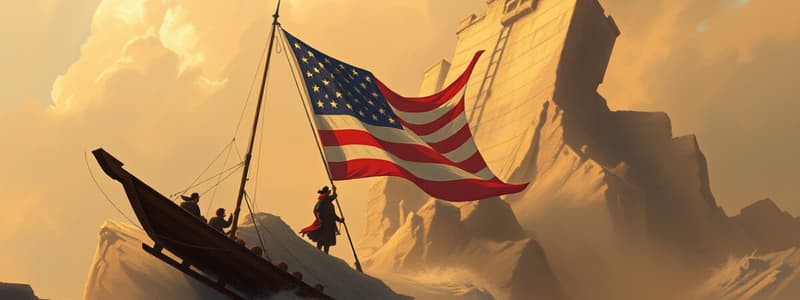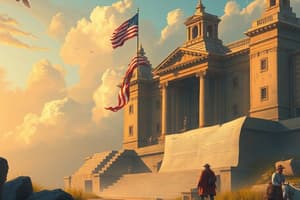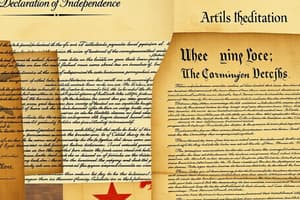Podcast
Questions and Answers
What belief is associated with the Declaration of Independence?
What belief is associated with the Declaration of Independence?
- Absolute monarchy
- Dictatorship
- Divine right of kings
- Consent of the governed (correct)
What did the Principles of the Constitution limit?
What did the Principles of the Constitution limit?
Power of the federal government
What rights are protected by the 1st Amendment?
What rights are protected by the 1st Amendment?
Freedom of religion, press, speech, assembly, and petition
What does the 5th Amendment ensure for people accused of crimes?
What does the 5th Amendment ensure for people accused of crimes?
The author of 'Democracy in America' is ______.
The author of 'Democracy in America' is ______.
Civic responsibilities include voting in elections.
Civic responsibilities include voting in elections.
What period is referred to as the Gilded Age?
What period is referred to as the Gilded Age?
How did electricity impact manufacturing?
How did electricity impact manufacturing?
What role did railroads serve for farmers?
What role did railroads serve for farmers?
What is an example of a monopoly?
What is an example of a monopoly?
What philanthropic contributions did Andrew Carnegie make?
What philanthropic contributions did Andrew Carnegie make?
What did labor unions fight for?
What did labor unions fight for?
What was urbanization a result of?
What was urbanization a result of?
What practice characterized political corruption?
What practice characterized political corruption?
Why did immigrants come to America?
Why did immigrants come to America?
What type of discrimination did Irish immigrants face?
What type of discrimination did Irish immigrants face?
What did nativists want regarding immigration?
What did nativists want regarding immigration?
What was the purpose of the Chinese Exclusion Act?
What was the purpose of the Chinese Exclusion Act?
What did the Homestead Act result in?
What did the Homestead Act result in?
What was the intention of the Dawes Act?
What was the intention of the Dawes Act?
What was the Populist Party Platform focused on?
What was the Populist Party Platform focused on?
What did Upton Sinclair's book 'The Jungle' lead to?
What did Upton Sinclair's book 'The Jungle' lead to?
What did Jane Addams establish?
What did Jane Addams establish?
What organization did W.E.B. DuBois help found?
What organization did W.E.B. DuBois help found?
What state reforms increased democratic participation?
What state reforms increased democratic participation?
What did the Pure Food and Drug Act do?
What did the Pure Food and Drug Act do?
What was the purpose of the National Park Service?
What was the purpose of the National Park Service?
What did the 19th Amendment accomplish?
What did the 19th Amendment accomplish?
Prohibition was initially successful in decreasing crime rates.
Prohibition was initially successful in decreasing crime rates.
What were the causes of the Spanish-American War?
What were the causes of the Spanish-American War?
What was one effect of the Spanish-American War?
What was one effect of the Spanish-American War?
What were reasons for American expansionism?
What were reasons for American expansionism?
Who advocated for overseas expansions by growing the U.S. Navy?
Who advocated for overseas expansions by growing the U.S. Navy?
What was Hawaii's relationship with the U.S.?
What was Hawaii's relationship with the U.S.?
What territory did the U.S. gain after the Spanish-American War?
What territory did the U.S. gain after the Spanish-American War?
Why did the U.S. see a need for the Panama Canal?
Why did the U.S. see a need for the Panama Canal?
What were the causes of WWI?
What were the causes of WWI?
What characterized trench warfare?
What characterized trench warfare?
What was the result of the Zimmermann Telegram?
What was the result of the Zimmermann Telegram?
What did unrestricted submarine warfare lead to?
What did unrestricted submarine warfare lead to?
Who led the American Expeditionary Force (AEF)?
Who led the American Expeditionary Force (AEF)?
What did the Espionage Act limit?
What did the Espionage Act limit?
What were Wilson's Fourteen Points intended to establish?
What were Wilson's Fourteen Points intended to establish?
What did the Palmer Raids aim to do?
What did the Palmer Raids aim to do?
What was an effect of mass-manufacturing?
What was an effect of mass-manufacturing?
What characterized flappers in the 1920s?
What characterized flappers in the 1920s?
What was the Great Migration?
What was the Great Migration?
What was the Harlem Renaissance?
What was the Harlem Renaissance?
What did overspeculation in the stock market lead to?
What did overspeculation in the stock market lead to?
What characterized the Great Depression?
What characterized the Great Depression?
What caused the Dust Bowl?
What caused the Dust Bowl?
What role did the New Deal play?
What role did the New Deal play?
What does the FDIC provide?
What does the FDIC provide?
What did the Social Security Act create?
What did the Social Security Act create?
What were unconstitutional programs in relation to New Deal policies?
What were unconstitutional programs in relation to New Deal policies?
What was Roosevelt's Court Packing Plan?
What was Roosevelt's Court Packing Plan?
What did the 22nd Amendment achieve?
What did the 22nd Amendment achieve?
What event led to the U.S. entering WWII?
What event led to the U.S. entering WWII?
The justification for war included the stop of ______ spread.
The justification for war included the stop of ______ spread.
What were Victory Gardens?
What were Victory Gardens?
What new roles did women take during the war?
What new roles did women take during the war?
What did Japanese American internment camps violate?
What did Japanese American internment camps violate?
What role did the Navajo Code Talkers play?
What role did the Navajo Code Talkers play?
Who was Vernon Baker?
Who was Vernon Baker?
What was the Holocaust?
What was the Holocaust?
What was the significance of the Atomic Bomb?
What was the significance of the Atomic Bomb?
What was the purpose of the Berlin Airlift?
What was the purpose of the Berlin Airlift?
What was the Marshall Plan designed for?
What was the Marshall Plan designed for?
What was the Korean War focused on?
What was the Korean War focused on?
What was the Arms Race?
What was the Arms Race?
What was the significance of Sputnik?
What was the significance of Sputnik?
What did the House Un-American Activities Committee (HUAC) investigate?
What did the House Un-American Activities Committee (HUAC) investigate?
What was McCarthyism?
What was McCarthyism?
What caused the growth of suburbs after WWII?
What caused the growth of suburbs after WWII?
What benefit did the GI Bill provide?
What benefit did the GI Bill provide?
What characterized economic prosperity post-WWII?
What characterized economic prosperity post-WWII?
What did vaccines aim to do?
What did vaccines aim to do?
What did Brown v. Board of Education require?
What did Brown v. Board of Education require?
Who was Martin Luther King Jr.?
Who was Martin Luther King Jr.?
What was the purpose of the Black Panthers?
What was the purpose of the Black Panthers?
What happened in Little Rock, Arkansas?
What happened in Little Rock, Arkansas?
What was the aim of the March on Washington?
What was the aim of the March on Washington?
What did the Civil Rights Act of 1965 require?
What did the Civil Rights Act of 1965 require?
What was the focus of the Equal Employment Opportunity legislation?
What was the focus of the Equal Employment Opportunity legislation?
What did the Voting Rights Act of 1965 end?
What did the Voting Rights Act of 1965 end?
Who was Shirley Chisholm?
Who was Shirley Chisholm?
What did the Cuban Missile Crisis involve?
What did the Cuban Missile Crisis involve?
What did the Medicare Act of 1965 provide?
What did the Medicare Act of 1965 provide?
What was the Housing and Urban Development Act of 1965 (HUD) aimed at?
What was the Housing and Urban Development Act of 1965 (HUD) aimed at?
What did the Chicano Workers Movement strive for?
What did the Chicano Workers Movement strive for?
What was the Chicano Mural Movement focused on?
What was the Chicano Mural Movement focused on?
What did the Countercultural Movement represent?
What did the Countercultural Movement represent?
What was the primary goal of the Vietnam War for the U.S.?
What was the primary goal of the Vietnam War for the U.S.?
What allowed the president to take military action without a declaration of war?
What allowed the president to take military action without a declaration of war?
What characterized the Anti-War Movement?
What characterized the Anti-War Movement?
What did the War Powers Resolution do?
What did the War Powers Resolution do?
What agency was created to protect the environment?
What agency was created to protect the environment?
What did the Watergate scandal lead to?
What did the Watergate scandal lead to?
What is OPEC?
What is OPEC?
What was the outcome of the Camp David Accords?
What was the outcome of the Camp David Accords?
Flashcards are hidden until you start studying
Study Notes
Declaration of Independence
- Asserted the belief in consent of the governed, influencing democratic movements globally.
- Marked the recognition of the United States as an independent entity by other nations.
Principles of the Constitution
- Established limits on federal government power through separation of powers and checks and balances.
1st Amendment
- Guarantees fundamental freedoms: religion, press, speech, assembly, and petition.
5th Amendment
- Ensures rights of individuals accused of crimes, including the requirement for Miranda rights.
- Addresses eminent domain, protecting individuals from unlawful seizure of property.
Alexis de Tocqueville
- Analyzed American democracy, highlighting key themes: liberty, egalitarianism, individualism, populism, and laissez-faire economics.
Civic Responsibilities
- Emphasizes the importance of voting and jury service as fundamental to democratic participation.
Gilded Age
- Characterized by significant wealth accumulation among businesses and corruption among government officials favoring corporate interests.
Electricity
- Revolutionized manufacturing efficiency; the invention of the light bulb extended working hours and production capacity.
Railroads
- Enhanced access for farmers to distant markets and facilitated westward expansion.
Monopolies
- Represent total control of a market by one company; anti-monopoly laws enacted to safeguard consumer prices.
Andrew Carnegie
- Prominent philanthropist known for significant contributions to education and the arts, reflecting a commitment to advancing society.
Labor Unions
- Advocated for improved wages and working conditions for laborers, marking an important development in workers' rights.
Urbanization
- Growth of industries prompted mass migration to cities, resulting in overcrowding and sanitation issues.
Political Corruption
- Involvement of government officials in bribery and the manipulation of votes through political machines for personal gain.
Immigrants
- Arriving for better economic opportunities, many faced pressure to assimilate into American culture.
Irish Immigrants
- Faced discrimination largely due to religious beliefs, particularly their Catholic faith.
Nativists
- Individuals advocating for restrictions on immigration and promoting cultural assimilation.
Chinese Exclusion Act
- Legislation aimed at curtailing Chinese immigration due to job competition fears in the West.
Homestead Act
- Promoted settlement and agricultural development in the western frontier.
Dawes Act
- Aimed to assimilate Native Americans into American culture through land allotments.
Populist Party Platform
- Advocated for monetary reform, including the coinage of silver, a graduated income tax, and railroad regulation.
Upton Sinclair
- Wrote "The Jungle," leading to food safety reforms and the establishment of the FDA.
Jane Addams
- Established the settlement house movement to support immigrant integration into American society.
W.E.B. Du Bois
- Co-founder of the NAACP, advocating for the civil rights of African Americans through legal channels.
State Reforms
- Initiatives such as referendums and recalls aimed at increasing citizen participation and accountability in government.
Pure Food and Drug Act
- Legislation enforcing consumer protection in food products, spurred by investigative journalism from muckrakers.
National Park Service
- Established under Roosevelt's administration to conserve natural lands.
19th Amendment
- Granted women the right to vote, marking a critical milestone in women's suffrage.
Prohibition
- Efforts to eliminate alcohol consumption led to increased organized crime and creation of speakeasies.
Causes of Spanish-American War
- Key events included the Cuban Revolution and the mysterious sinking of the U.S.S. Maine.
Effects of Spanish-American War
- Catalyst for the United States to emerge as an imperial power on the world stage.
Reasons for Expansionism
- Motivated by resource acquisition and the drive to open new markets for trade.
Alfred Thayer Mahan
- Advocated for strengthening the U.S. Navy to support overseas expansion.
Hawaii
- Involuntary annexation facilitated by influential figures like Sanford B. Dole.
Puerto Rico
- Became a U.S. territory following the Spanish-American War.
Panama Canal
- Strategic construction was influenced by the need for quicker naval and commercial transit, initiated by Roosevelt's policies.
Causes of WWI
- Notable factors included militarism and the assassination of Archduke Franz Ferdinand.
Trench Warfare
- Characterized by a stalemate on the Western Front, soldiers operated in entrenched positions with devastating modern weaponry.
Zimmermann Telegram
- German communication seeking an alliance with Mexico, which shifted U.S. public opinion away from neutrality.
Unrestricted Submarine Warfare
- German attacks on American merchant vessels directly led to U.S. involvement in WWI.
American Expeditionary Force
- Troops trained under General John J. Pershing played crucial roles during significant counterattacks in WWI.
Espionage Act
- Legislation that curtailed freedom of speech during wartime under the guise of national security.
Wilson's Fourteen Points
- President Wilson's vision for post-war peace including the proposal for a League of Nations, which Congress ultimately rejected.
Palmer Raids
- Government response to fears of communism led to the arrest and deportation of suspected radicals.
Mass-Manufacturing
- Innovations in production resulted in widespread affordability of goods, notably automobiles.
Flappers
- Young women in the 1920s who defied social conventions through fashion and behavior, symbolizing a cultural shift.
Great Migration
- Movement of African Americans from the South to Northern cities seeking better economic conditions.
Harlem Renaissance
- Flourishing of African American culture and arts in the 1920s, which laid groundwork for future civil rights movements.
Overspeculation
- Contributed significantly to the onset of the Great Depression by inflating stock market values.
Great Depression
- Severe economic downturn characterized by high unemployment, business failures, and widespread poverty.
Dust Bowl
- Environmental disaster fueled by drought and unsustainable farming practices.
New Deal
- Series of programs aimed at economic recovery and welfare provision established a new role for the federal government.
Federal Deposit Insurance Corporation (FDIC)
- Ensured the safety of bank deposits, restoring public confidence in the banking system.
Social Security Act
- Created a benefits program aimed at assisting the elderly, disabled, and retired, expanding government responsibility.
Unconstitutional Programs
- Supreme Court interventions using the 10th Amendment resulted in the nullification of certain New Deal initiatives.
Roosevelt's Court Packing Plan
- Controversial strategy intended to increase presidential power amidst opposition to New Deal policies.
22nd Amendment
- Established a two-term limit for the presidency in response to Franklin D. Roosevelt's four terms in office.
Pearl Harbor
- Japanese attack that prompted U.S. entry into World War II.
Justification for War
- Aimed at maintaining international stability and countering totalitarian regimes.
Victory Gardens
- Home gardens promoted during WWII to bolster food production for the war effort.
Women
- Assumed diverse roles during the war, from nursing to industrial labor, contributing significantly to wartime production.
Japanese American Internment Camps
- Government-sanctioned removal of Japanese Americans, contravening 14th Amendment rights.
Navajo Code Talkers
- Native speakers who played a crucial role in secure communications during WWII.
Vernon Baker
- Notable African American WWII veteran awarded the Medal of Honor for acts of valor.
The Holocaust
- Systematic genocide perpetrated by the Nazis that led to Jewish migration to the U.S. for refuge.
Atomic Bomb
- New weaponry developed leading to Japan's surrender and initiating an arms race with the Soviet Union.
Berlin Airlift
- Humanitarian effort to supply West Berlin amidst a Soviet blockade, avoiding direct military conflict.
Marshall Plan
- Economic assistance program to help rebuild Western European nations post-WWII, aimed at preventing the spread of communism.
Korean War
- Conflict fueled by communist expansion, resulting in U.N. intervention following North Korea's invasion of South Korea.
Arms Race
- Competition between the U.S. and the Soviet Union over nuclear arsenal development, accelerating advancements in science and technology.
Sputnik
- Soviet satellite launch that led to increased U.S. investment in education and technology in response.
House Un-American Activities Committee (HUAC)
- Investigative committee focused on rooting out suspected communist sympathizers in the U.S.
McCarthyism
- Period of intense anti-communist sentiment marked by aggressive investigations and accusations led by Senator Joseph McCarthy.
Suburbs
- Post-WWII prosperity and baby boom resulted in increased suburban housing developments.
GI Bill
- Legislation that funded education for military veterans, promoting higher education access.
Economic Prosperity
- Rise in consumer spending and middle-class growth contributed to infrastructure developments like the interstate highway system.
Vaccines
- Development of life-saving vaccines, such as Jonas Salk's polio vaccine, played a crucial role in public health initiatives.
Brown v. Board of Education
- Landmark Supreme Court decision mandating the desegregation of schools, supported by the NAACP.
Martin Luther King Jr.
- Influential civil rights leader advocating for nonviolent protest and civil disobedience.
Black Panthers
- Civil rights organization known for militant self-defense measures against racial oppression, led by Huey Newton.
Little Rock, Arkansas
- Site of a significant civil rights standoff where Governor Faubus resisted federal desegregation orders.
March on Washington
- Peaceful demonstration advocating for civil and economic rights for minorities.
Civil Rights Act of 1965
- Legislation aimed at ensuring workplace equality for minorities.
Studying That Suits You
Use AI to generate personalized quizzes and flashcards to suit your learning preferences.




